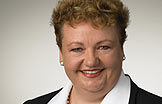John Maurice Clark, a distinguished American economist, wrote in The Journal of Political Economy (1918) that "the consistent economic man has long been known to be a sheer abstraction, though not everyone has recognized the importance of the elements left out."
Overcoming the hard wiring
For much of the 20th century, mainstream economics not only failed to recognize the importance of human behavior, one of the most important "elements left out," it clung to the abstraction. In its most extreme expression, mathematical finance, the human factor was largely removed from the equation. While this resulted in beautiful mathematical models, traditional economics proved to have its limits.
From the 1960s onwards, there was a growing awareness, as economist Robert Shiller once expressed it: "That things aren't perfect. That the world is not perfect and that we have real people in the world."
Behavioral finance strives to recognize the role of human behavior. While traditional economics teaches that humans are rational actors who behave as selfish utility maximizers, behavioral finance examines how "bounded rationality" can result in faulty decisions that sometime run counter to the individual's best interests.
In a way, economists have always been aware of this. In The Theory of Moral Sentiments (1759), Adam Smith saw human behavior as anything but self-interested and was rather driven by "passions." Wesley Mitchell, Irving Fisher, John Maynard Keynes, Friedrich von Hayek and others have also emphasized the fallibility of human decision making.
The current issue of PROJECT M _blank offers an introduction to the latest trends in behavioral finance, the insights they provide into helping us overcome the hard wiring of our natures and the tools that have been developed to help us nudge our behavior for our own good.
This is not because behavioral finance has been invalidated, but because its insights are becoming so accepted among economists that they will automatically incorporate it into their models.
In addition, the relaunched PROJECT M online offers weekly updates in a new and modern layout. Find out how we are fooled by our perception _blank or watch video interviews _blank with Shlomo Benartzi, Richard Thaler and many other leading experts in the field.
To request a hardcopy of PROJECT M please contact the editorial team at projectm@allianz.com.

As with all content published on this site, these statements are subject to our Forward Looking Statement disclaimer.
Link to the disclaimer